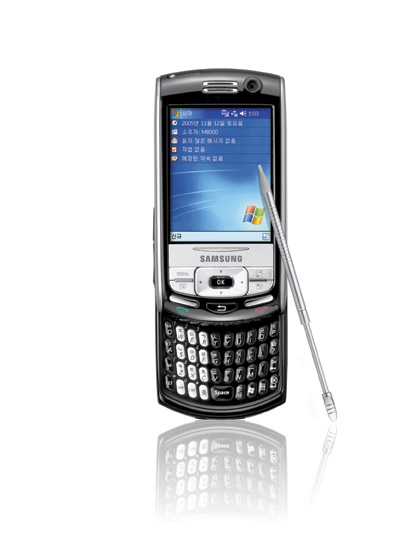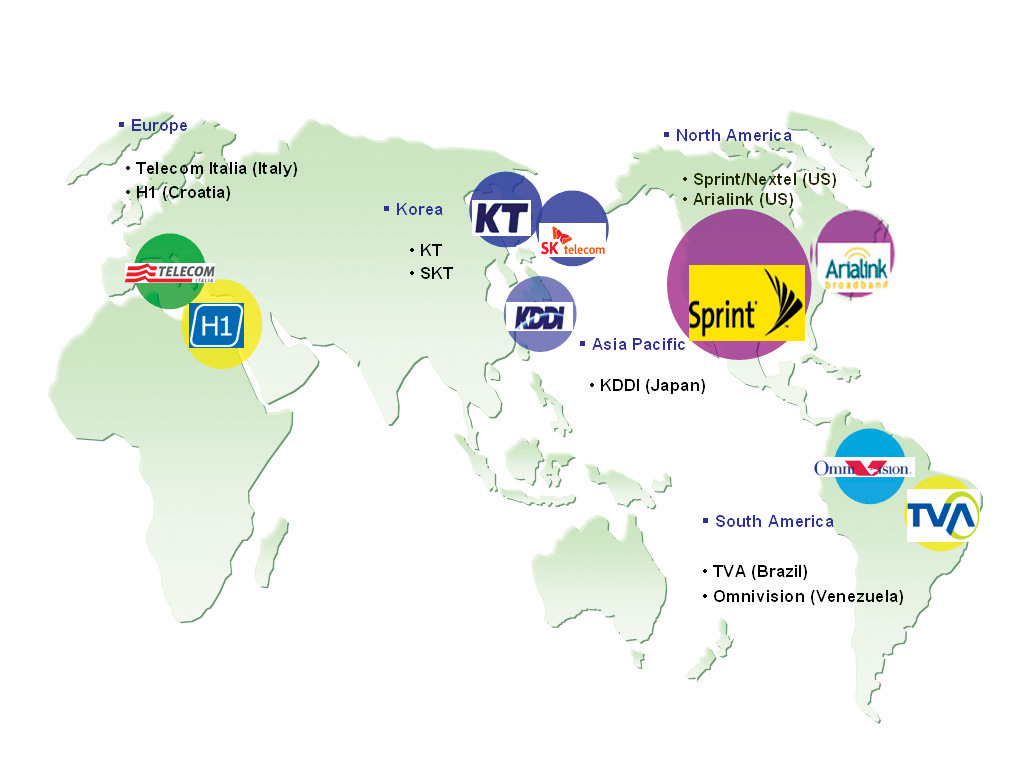Samsung Electronics'Wibro
Advances to U.S. Market
Likely to accelerate the global deployment of mobile Internet technology
 WiBro, a next-generation mobile broadband technology developed by Korea, will penetrate the United States, the world's largest telecommunication market, setting a milestone in the history of the global mobile telecommunication industry.
WiBro, a next-generation mobile broadband technology developed by Korea, will penetrate the United States, the world's largest telecommunication market, setting a milestone in the history of the global mobile telecommunication industry.
Samsung Electronics, Sprint Nextel, Intel and Motorola agreed in New York on Aug. 8 in to forge a strategic alliance to promote cooperation and commercialize the WiBro sector, the Korean electronics company said.
Sprint said it would launch commercial WiBro services in the whole of the U.S. after adopting Samsung Electronics'WiBro as a fourth-generation (4G) telecommunication technology platform in accordance with their strategic alliance with Samsung Electronics.
Sprint, which has test-operated the WiBro system and terminal offered by Samsung Electronics, is set to embark on full-fledged commercial WiBro services.
One of the United States'largest wired and wireless telecommunication operators,
 Sprint occupies 85 percent of the 2.5GHz band frequency for next-generation mobile Internet services. Sprint aims at building up infrastructure for 100 million subscribers before the launch of full-fledged commercial WiBro services.
Sprint occupies 85 percent of the 2.5GHz band frequency for next-generation mobile Internet services. Sprint aims at building up infrastructure for 100 million subscribers before the launch of full-fledged commercial WiBro services.
For the successful launch of commercial WiBro services, Sprint has adopted Samsung Electronics, Intel and Motorola as its partners. Samsung Electronics plans to not only supply base station equipment, terminals and chip sets, but also conduct common marketing activities aimed at the successful spread of the WiBro services.
Samsung Electronics, the world's first company to develop technologies related to the WiBro base station and terminal, successfully demonstrated WiBro services during the APEC summit held in Busan last December to take a lead in the global standardization of WiBro technologies.
Samsung Electronics'strategic alliance with Sprint testifies that the Korean electronics giant is positioning itself as the global WiBro leader of the U.S. next-generation trunk telecom network.
 WiBro, also known as WiMax, has become an international standard.
WiBro, also known as WiMax, has become an international standard.
Lee Ki-tae, president of Samsung Electronics Telecommunications Network, said, "The decision to commercialize WiBro services marks a watershed in the U.S. telecommunication industry. I'm sure Sprint will emerge as a global telecommunication leader through WiBro services.'He emphasized that WiBro, the fastest mobile Internet technology in the world, will likely create a new paradigm in mobile telecom services and advance a ubiquitous era.
Gary Forsee, president of Sprint Nextel, said his company would strive to commercialize WiBro services as soon as possible to provide full-fledged next-generation wireless telecommunication services by forging a strategic alliance with Samsung Electronics, which has secured top-notch experience and expertise in the WiBro area.
ANOTHER IT SUCCESS STORY VIA COLLABORATION AMONG GOVERNMENT, SMES AND SAMSUNG ELECTRONICS. This is the first time that a telecommunication system, developed by Korea on its own,
 will be exported to the United States, which has hegemony over the global telecommunication industry.
will be exported to the United States, which has hegemony over the global telecommunication industry.
Samsung Electronics Lee, who has dreamed of having deployed Korean telecom equipment to the United States, said that WiBro has become the first technology in history of Korean telecommunication industry to be adopted as the U.S. trunk telecommunication network, and it will serve as an opportunity for Korean IT technologies and related industries to be upgraded.
As countries have competed for hegemony over advanced technologies following the launch of third-generation telecom technologies, WiBro's advance to the United States, riding on the Korean government's so-called IT839 Strategy, is likely to accelerate the global deployment of WiBro, local analysts said.
A Samsung Electronics official said WiBro's advance to the United States, which has applied stringent rules to the deployment of foreign-made telecommunication equipment, is expected to prompt other countries to join in the introduction of the WiBro technology.
 The deployment of WiBro to the United States has increased the number of countries from seven to nine of major operators with which Samsung Electronics has supplied the WiBro system and terminals to commercialize next-generation mobile Internet services. These countries include Italy and Croatia (Europe region), the United States (North America), Venezuela and Brazil (Latin America), and Japan (Asia).
The deployment of WiBro to the United States has increased the number of countries from seven to nine of major operators with which Samsung Electronics has supplied the WiBro system and terminals to commercialize next-generation mobile Internet services. These countries include Italy and Croatia (Europe region), the United States (North America), Venezuela and Brazil (Latin America), and Japan (Asia).
Samsung Electronics'deployment of WiBro to the Unites States is significant in that Korea has succeeded in sowing the seeds to create a new IT industry following its success story on the commercialization of CDMA (code-division multiple access) technology and Korea's elevation to a global IT powerhouse. The size of the WiBro system and terminal market is forecast to make a remarkable growth to 1.6 trillion won in 2007, 3.8 trillion won in 2008 and 6.6 trillion won in 2009. The market is estimated to surge to 11.6 trillion won in 2010.
Samsung Electronics'deployment of WiBro to the United States will facilitate Korean SMEs'simultaneous entry to the American market as Samsung and SMEs have so far built up close cooperative networks in such areas as WiBro equipment, parts and contents.
Samsung Electronics'advance to the United States is tantamount to laying a foundation for Korea's IT sector's take-off. If the WiBro industry is in full blossom, it could have an impact of creating up to 270,000 jobs, local analysts say.
A Samsung Electronics official called WiBro's advance to the United States "A Myth of IT Korea's Success Story'and the time is not far away for WiBro to serve as Korea's breadwinner. nw
Lee Ki-tae, president of Samsung Electronics Telecommunications Network, and his counterparts from Sprint Nextel, Intel and Motorola join hands after agreeing to forge a strategic alliance on the commercialization of WiBro in New York on Aug. 8.
Lee Ki-tae, president of Samsung Electronics Telecommunications Network, poses with Lim Chu-hwan, ETRI president, during a demonstration of WiBro hand-over technology.
This map shows the countries where Samsung Electronics has supplied the WiBro system and terminals to commercialize next-generation mobile Internet services.
3Fl, 292-47, Shindang 6-dong, Chung-gu, Seoul, Korea 100-456
Tel : 82-2-2235-6114 / Fax : 82-2-2235-0799